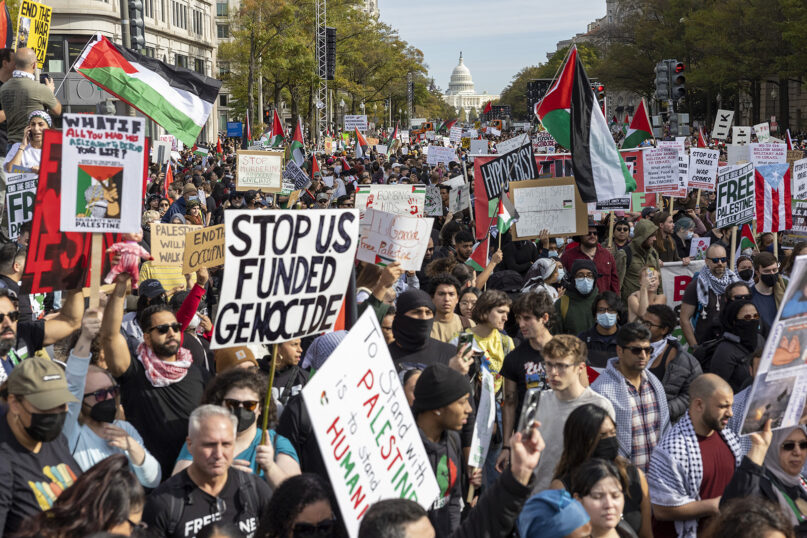(RNS) — Despite the protests against racialized police brutality that spanned the globe a few summers ago, police continue to kill Black civilians at the same or higher rate than before the world learned the name of George Floyd.
Similarly, while hundreds of thousands have crowded streets worldwide with desperate chants of “Cease-fire now,” decrying the slaughter of the Palestinian people by Israeli forces, the body count in Gaza continues to soar as Israel prepares for a ground offensive against Rafah.
The mass movement to free Palestine, in other words, suffers from the same problem as the Black Lives Matter protests of 2020.
Both display a common weakness in many recent mass protest movements: We often lack the theoretical knowledge and organizational capacity to do more than protest. To build the most powerful resistance to oppression possible, people of goodwill will have to learn how to escalate our nonviolent tactics beyond simply expressing our grievances in public.
A widespread misconception about “nonviolence” conflates the term and the tradition with simple protest. But protest is just one category of nonviolent methods. History shows that oppressors rarely change course simply because the public expresses disagreement in the streets. The will of the people must be imposed on them, not simply expressed to them.
Like currency, in other words, protest needs to be backed by something. Sociologist Zeynep Tufekci suggests that protest is more powerful when backed by a movement’s actual “disruptive capacity” — “the ability to stop business as usual” and withstand repression while doing it.
The power of nonviolent civil resistance comes in imposing sanctions on the powers that be through collective action. This sounds outlandish until you realize that the powers who run the system can’t run the system by themselves. They depend on our labor and consumer dollars to keep the global system of militant profitmaking running. When we withdraw those resources through boycotts, strikes and other actions, it twists the arm of the oppressor in a way protest doesn’t.
What I’ve described above is the difference between acts of mass persuasion or expression and acts of mass noncooperation and intervention.
“The purpose of our direct action program is to create a situation so crisis-packed that it will inevitably open the door to negotiation,” wrote the Rev. Martin Luther King Jr., defending the Civil Rights Movement in his famous “Letter from Birmingham Jail.” The campaign he was defending combined boycotts of segregated businesses, kneel-ins at churches, street demonstrations, school walkouts, lunch counter sit-ins, voter registration and more. These efforts took months of planning and training and were timed for maximum economic impact.
The protest demonstrations against Jim Crow were backed by a profound understanding of the flow of power in Birmingham, Alabama, and how to disrupt it. It took hundreds of trained volunteers, lawyers to help navigate the legal terrain, a bail fund, allies in local media, a network of supportive churches and clergy, and more.
The Civil Rights Movement has much to teach today’s freedom seekers, particularly on how to move beyond speaking truth to power in protest and wielding collective power over the powers that be. The next steps to demanding change are strikes, divestment campaigns and boycotts, as these affect more than public opinion.
To be sure, mass protest is important and is a proven way to shift the values of a society. It’s great for building morale, recruiting supporters and raising awareness. It can even be utilized as part of civil disobedience. However, it shouldn’t be the only nonviolent tool in our toolbox. A march is not a movement.
If a movement can’t do more than protest, it’s just begging.






